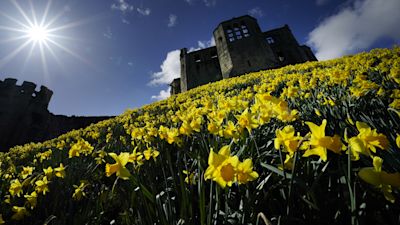Climate change causing UK plants to bloom month early, 'alarming' study shows

Climate change is causing plants in the UK to flower a month earlier with some species at risk of going extinct, "alarming" results from a new study show.
An expert has warned if global temperatures continue to rise at their current rate, spring could eventually start in February in the UK.
Researchers from Cambridge University analysed more than 400,000 observations of 406 plant species in a citizen science database with records going back to the 18th Century.
They used observations of the first flowering date of trees, shrubs, herbs and climbers, in locations from the Channel Islands to Shetland, and from Northern Ireland to Suffolk.
The team identified that the average first flowering date from 1987 to 2019 was a full month earlier than the average first flowering date from 1753 to 1986. This time period coincides with accelerating global warming caused by human activity.
Lead author Professor Ulf Buntgen, from Cambridge’s department of geography, said: “The results are truly alarming, because of the ecological risks associated with earlier flowering times.
“When plants flower too early, a late frost can kill them – a phenomenon that most gardeners will have experienced at some point.
“But the even bigger risk is ecological mismatch.
“Plants, insects, birds and other wildlife have co-evolved to a point that they’re synchronised in their development stages.
“A certain plant flowers, it attracts a particular type of insect, which attracts a particular type of bird, and so on.
“But if one component responds faster than the others, there’s a risk that they’ll be out of sync, which can lead species to collapse if they can’t adapt quickly enough.”
The dataset, called Nature’s Calendar, is maintained by the Woodland Trust. It includes observations of seasonal change as recorded by scientists, naturalists, amateur and professional gardeners, as well as organisations such as the Royal Meteorological Society.
Prof Buntgen said anyone in the UK can log their observations of plants and wildlife and submit a record to Nature'a Calendar - something that will help scientists "quantify how climate change is affecting the functioning of various ecosystem components across the UK.”
“We can use a wide range of environmental datasets to see how climate change is affecting different species, but most records we have only consider one or a handful of species in a relatively small area,” said Prof Buntgen.
“To really understand what climate change is doing to our world, we need much larger datasets that look at whole ecosystems over a long period of time."
The researchers classified the latest set of observations, published in the journal Proceedings of the Royal Society B, in various ways - by location, elevation, and whether they were from urban or rural areas.
The first flowering dates were then compared with monthly climate records.
To better balance the number of observations, the researchers divided the full dataset into records until 1986, and from 1987 onwards.
Co-author Professor Tim Sparks, of Cambridge’s department of zoology, said: “Continued monitoring is necessary to ensure that we better understand the consequences of a changing climate.”